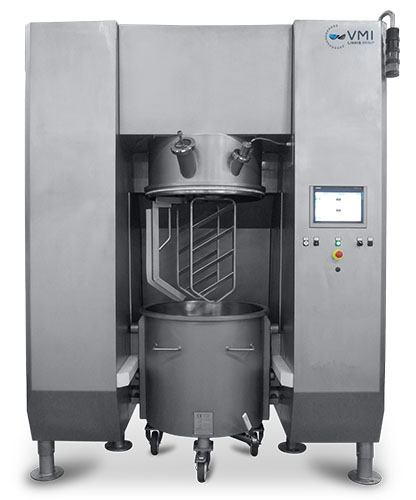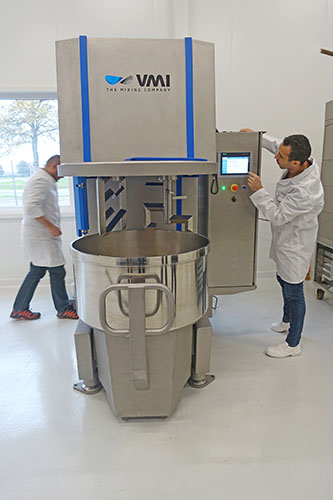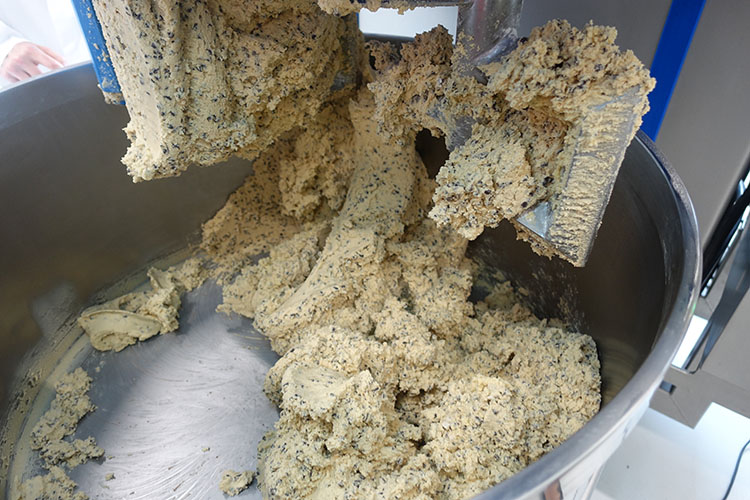
The demand in global markets is changing. The focus is increasingly on snack products. This is also reflected in the program of the French dough production specialist VMI.
According to Bakery Division Director Mikaël Roussière: “The market for products sold in out-of-house consumption is growing worldwide. The market is shifting at the same time from crispy crunchy bread/bread rolls to soft bread/soft bread rolls, pastries, cookies and crackers. Thus the proportion of doughs and mixes not produced in classical spiral mixers is also growing. Ultimately this also shifts VMI’s focus.”
This company, which moved into a completely new location a few months ago in Saint-Hilaire-de-Loulay nearly 40 km south of Nantes in Brittany, France, is in business worldwide today. VMI earns more than half its total revenues internationally through large bakeries. The artisan market proportion has now dropped to below 20%. This also reflects the structural change in the French bakery sector. Around two thirds of the French market still belongs to small artisan businesses, but the importance of chain store systems operating regionally or even nationally is growing.
To implement the changed requirements in mixing and kneading technology, VMI has worked intensively for four years with the University in Nantes and with the INRA-
ONIRIS Institute (National Agricultural Research Institute – Nantes-Atlantic National College of Veterinary Medicine, Food Science and Engineering) located there, where staff such as Prof. Alain Lebail or Prof. Hubert Chiron teach. The main topic of the joint research is to record data about the connection between the different forces during the various process phases and the characteristics of the mix, to enable the fine control of dough development. The aim is to allow the mixing process to be adjusted to various parameters including regional flour qualities. Another project is devoted to extracting surplus energy arising as a result of the rotation of the bowl and using it to drive the tools. According to R&D Manager José Cheio de Oliveira, this permits an energy saving of up to 20%, depending on the dough viscosity.

The new planetary mixer

The Kneadster – a mixing and kneading machine with interchangeable double tools that is equally suitable for kneading bread dough and for producing cookie/biscuit doughs

Cookie dough made by the Kneadster without damaging the chocolate nibs
The initial research results have been included in the development of the “Kneadster”, a vertical mixer with interchangeable double tools. The various tools are matched to the respective needs of the product, and are thus universally usable. French customers use them to produce brioche doughs, customers in the UK use the Kneadster for cookie doughs with sensitive ingredients like chocolate nibs, and those in Russia use it to prepare doughs for Russian “baton” white bread.
The shift in out-of-house markets towards products more likely to be made from mixes than from doughs produced in a spiral mixer has led to a situation in which there is again a stronger focus on planetary mixers at VMI. The mixer, which was constructed as a portal plant, was completely re-engineered and is now available as the Ultimix in various sizes with a bowl capacity from 200 to 1,200 liters. Pressure and vacuum can also be applied to it. During re-engineering, the machine’s head in which the tools are anchored was given an extremely shallow design so the space between the drive and the wall can be cleaned completely and safely by the build-in CIP plant. The temperature management in the container’s double jacket is also new, to ensure no heat-related adhesions occur even with sensitive products such as egg mixes. Customers use these plants nowadays to prepare fillings, donut mixes and doughs for gluten-free bread.
Of course, the classic batch mixer remains a stable element in VMI’s product catalog. In addition to individual spiral mixers and fork mixers, the main products sold to bread manufacturers worldwide today are automated solutions of various sizes consisting of mixers, metering stations and dough resting stations. On the other hand, the Continuum is aimed at the market for industrial production of doughs for sandwich bread, buns or toast. This is the name given to a continuous mixer in various sizes with an hourly output capacity of one to eight tons of dough that can deliver a particularly finely porous dough in a two-stage process using pressure and vacuum. The team led by R&D Manager José Cheio de Oliveira is currently developing a new metering controller for the continuous mixer and an even more efficient use of energy.
VMI
Headquarters: Saint-Hilaire-de-Loulay in the Vendée (Western France)
Subsidiaries: VMI North America, VMI South Asia (from 2018 onwards)
Group membership: Linxis Group, owner: IK Partner, revenues in 2017: EUR 220m.
Sister companies: Shick/Esteve, Diosna, Chalon Megard, Simon Frères, Tecnal
VMI revenues in 2017: EUR 57m, of which 65% bakery, 17% service and 17% cosmetic, pharmaceutical and chemical industry
VMI overall export ratio: 60%, bakery business export ratio: 80%
VMI employees: 220
Moreover, VMI is also working on a comprehensive program across all mixer classes to gather data about machines and plants that are established worldwide. According to Mikaël Roussière, this program is aimed at continuously recording the functional values of the machines, e.g. run times, energy consumption, wear etc., and at using the resulting information pool in two respects. Firstly, the assessment will give machine and plant users information with which they can optimize their usage and the repairs or parts replacements likely to occur in the foreseeable future, and secondly VMI can use the aggregated data as a basis for technical improvements. According to Roussière: “It’s a program that yields benefits for both sides.”


